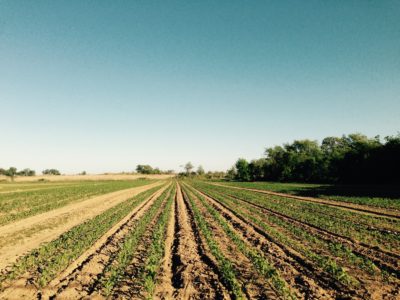Blog
Donor Spotlight | Anne Hopkins Desire to Protect North Fork Farmland
When I bought my house in Orient in 1978 there were potatoes growing in the fields behind me and also across the road. The one-acre rectangle my very old house had been moved to in 1963 was carved out of land that had been in a branch of the Terry family since they came to the North Fork in the 17th century. But modern Terrys, like other families, sold lots on the road and the water to enable them to make a go of the rest.
Then in the summer of 1979 came the Temik pesticide crisis. Orient’s potato farmers, who depended on it, went out of business, while the manufacturer, Union Carbide, provided us with filters for our wells. Thus, from the beginning of my time on the East End I learned firsthand about the vulnerability of local farms.
I found Orient during my search for a place in the country accessible to Manhattan where I lived and worked. The marshes, creeks and shore birds were irresistible to me because of the many summers I spent in Ipswich north of Boston. As a young friend said at the time, I was cloning Ipswich.
I was a teenager when my family patriotically put in a wartime Victory Garden. I came to love homegrown Swiss chard and tomatoes, both of which I still grow in my own Orient garden. But I was not familiar with real farmland until I settled in Orient. After the potatoes left, the farmland behind me was leased for many years to a local farmer and my summer neighbors varied from peppers to cauliflower to corn. Today there are two houses and a third lot on those ten acres. Happily for me corn is growing in the field across the road.
In the 1980s, Orient was threatened by several developers seeking to build dozens of houses on large tracts of land from Orient Point to the causeway. I was part of the group that founded the Orient Association in 1985 to counter this trend. We learned that we could fight back. We saved Orient Point, now a county passive park, and the shoreline of Hallocks Bay, and the old Hallock Farm property down the road from me.
During the same period, the Peconic Land Trust was established in Southampton in 1983. As the Trust began to focus on the North Fork as well as the South side, I made my first donation. Of course, my motives are partly selfish, as I like to be surrounded by fields and woodland, which was especially true this past pandemic year. However, I became acutely aware that conserving farmland is a separate, crucial objective, different from preserving open space in general. I happily tolerate the farming negatives, like manure spreading and early-morning plowing.
![block.image[0].title](/assets/images/Edwards-Farm-equipment-and-sunflowers.jpg)
My most active involvement with the Trust was during the recent campaign to save the Edwards Farm property two miles from me in Orient. It is a continuing joy to me that we succeeded. This very local effort helped me understand just how important the function of a land trust can be.
Since I have now been a full-time resident of Orient for eight of my 43 years as a property owner here, it makes sense to me to devote a major share of my donations to a local organization whose officers I know and trust. Many of the Trust staff have deep roots in our community and really understand the needs of the East End. - Anne Hopkins
![block.image[0].title](/assets/images/Anne-Hopkins.jpg)
Anne Hopkins celebrating her 91st birthday with friends and family in Orient.
Thank you Anne for your support, involvement, and dedication to the Trust. We appreciate all that you do. And thank you to all who support our work!


